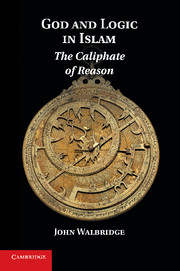Book contents
- Frontmatter
- Contents
- Illustrations
- Preface and Acknowledgements
- Spelling, Names, and Sources
- Introduction
- PART ONE THE FORMATION OF THE ISLAMIC TRADITION OF REASON
- 1 The Problem of Reason in Islam: Is Islam a Non-Rational Religion and Civilization?
- 2 The Diversity of Reason
- 3 Empirical Knowledge of the Mind of God
- 4 The Failure of the Fārābian Synthesis of Religion and Philosophy
- 5 Mysticism, Postclassical Islamic Philosophy, and the Rise and Fall of Islamic Science
- PART TWO LOGIC, EDUCATION, AND DOUBT
- PART THREE THE FALL AND THE FUTURE OF ISLAMIC RATIONALISM
- Selected Bibliography
- Index
3 - Empirical Knowledge of the Mind of God
Published online by Cambridge University Press: 01 March 2011
- Frontmatter
- Contents
- Illustrations
- Preface and Acknowledgements
- Spelling, Names, and Sources
- Introduction
- PART ONE THE FORMATION OF THE ISLAMIC TRADITION OF REASON
- 1 The Problem of Reason in Islam: Is Islam a Non-Rational Religion and Civilization?
- 2 The Diversity of Reason
- 3 Empirical Knowledge of the Mind of God
- 4 The Failure of the Fārābian Synthesis of Religion and Philosophy
- 5 Mysticism, Postclassical Islamic Philosophy, and the Rise and Fall of Islamic Science
- PART TWO LOGIC, EDUCATION, AND DOUBT
- PART THREE THE FALL AND THE FUTURE OF ISLAMIC RATIONALISM
- Selected Bibliography
- Index
Summary
The medical historian Ibn al-Qifṭī, writing in the first half of the thirteenth century, reports that a certain John the Grammarian was the Jacobite bishop in Alexandria when the Muslim general ‘Amr b. al-‘Āṣ conquered Egypt in the mid-seventh century. John had rejected the usual Christian beliefs about the Trinity – which we may suppose means the Greek Orthodox views – in favor of a doctrine that ‘Amr found more acceptable. When the Arabs seized the city,
John appealed to ‘Amr, “Today you have seized everything in Alexandria and taken possession of all the booty in it. I do not dispute your right to what of it is useful to you, but we have a better right to that which is of no use to you, so order it to be returned.” ‘Amr said to him, “What is it that you need?” John replied, “The books of philosophy in the royal libraries. You have put a guard over them. We need them and they are of no use to you.”
John then explained that Ptolemy Philadelphus had established the library at great cost and effort, eventually accumulating 450,120 books. When his librarian told him that there nonetheless remained a great many more books in countries from India to Rome, Ptolemy was astonished and ordered him to continue collecting. Every ruler of Alexandria since that time had faithfully maintained the library's collection.
- Type
- Chapter
- Information
- God and Logic in IslamThe Caliphate of Reason, pp. 30 - 54Publisher: Cambridge University PressPrint publication year: 2010



